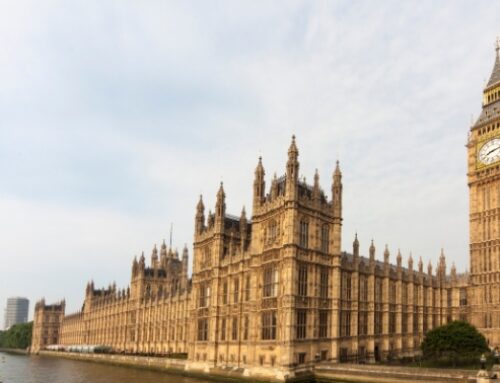In days gone by, savings accounts offered banks and their customers a mutually beneficial option for their money. Banks who offered the most favourable rates saw the most customers coming their way – and, in return for their business, customers could steadily grow their savings the longer they left them untouched.
Savings accounts are still a common staple at any high street bank, and plenty of us still have one open. These days, however, money stored in typical savings accounts is generally left to idle away – barely growing as a result of nominal interest rates.
For the average customer, placing money into a cash savings account offers no opportunity for growth when adjusting for inflation. Whilst alternative options such as investing into stocks, bonds, or tangible assets like property are available these do carry extra risks.
The ease, familiarity, and security offered by banks means that plenty still consider it their best – if not their only – option. For us, this highlights the importance of independent financial advisors who can research the whole market for the most suitable home for your savings.
But it wasn’t always the case that savings accounts squandered valuable opportunities to grow wealth. Here’s why bank rates are so unattractive to modern customers.
How do banks calculate interest for savings accounts?
There’s no definitive formula that sets the interest rates banks advertise in their windows. Instead, it all comes down to a few key economic criteria used to determine the best-case scenario for banks – in other words, high uptake from new and existing customers compared with the competition at the lowest impact to their profits.
The Monetary Policy Committee at the Bank of England set a Bank Rate, but banks don’t need to stick to it. It’s a guide rather than a rule, and interest rates tend to follow any dips or spikes in the Bank Rate.
Ultimately, interest is determined like the cost of bread or chocolate or any other product on the shelves. The figure varies from supplier to supplier (bank to bank), and it fluctuates according to demand and supply, the economy at large, and what the Bank of England has set as the base rate.
Or it used to.
The Bank of England is currently pushing interest rates higher in response to the cost-of-living crisis. Higher interest rates curb borrowing and encourage saving, which is ideal for enabling the economy to recover and avoid inflation rates spiralling out of control. These high interest rates are reflected in mortgage rates and the cost of taking out a loan, but, in theory, they should also be reflected in the interest rates on savings accounts.
So why are bank savings rates so poor right now?
In short, because banks are choosing not to pass the effects of higher interest rates onto their customers. Instead, those higher interest rates are feeding into their bottom lines, enabling banks to grow their margins despite the economic turbulence going on around them.
The Bank Rate currently sits at 5%. On average, however, a savings account available from a retail bank to the average customer offers an interest rate of just 1.88%. This is higher than it was a few months back, when inflation was lower, but it’s wildly out of alignment with the economy at large.
Consider the fact that NatWest has grown their margin by almost 25%, and HSBC recorded a 90% jump in profits at the end of Q4 in 2022.
There are no policies requiring banks to boost their interest rates, although plenty of economists have suggested that perhaps that’s exactly what the UK economy needs.
Is it worth having a savings account in the UK right now?
It’s always worth having money stored close to hand in case of a rainy day. Now more than ever, a financial buffer is vital, whether it’s only needed for peace of mind or to help you through a period of reduced earnings or unemployment.
But any money you do save is going to idle away and fail to accumulate any worthwhile interest – at least, not compared with what customers could be earning if interest rates mirrored rising inflation.
The alternative is investment. Rather than placing your money into an account and leaving it alone, investing enables you to put your money to use and work toward short- or long-term financial goals.
So, is it worth having money in savings? Yes and no. To an extent, an emergency fund saved in an easy-to-reach account with the most reasonable interest rates possible is always a good thing, but it’s all too easy to waste time on a low-yield account when you could be growing a strong and diverse investment portfolio. Cash savings are only valuable up to a certain point; after that, they’re doing you a disservice. When looking to place money away for growth over the long term, typically a 5 year + time horizon it can be worth speaking with an Independent Financial Adviser to explore your investment options.
Are non-liquid assets better?
There are some investment opportunities out there that promise a significant return in the long term. Land and property are perhaps the most obvious, while other assets like precious metals (gold) and art are also popular choices among investors.
Non-liquid assets can be a great addition to a balanced investment portfolio, although how good they are depends on the nature of the asset. Most vehicles, for instance, are not strong investments, since most cars depreciate in value the instant they are driven off the dealer’s forecourt. Diamonds, despite having a highly concentrated value, are also poor choices, since their resale value is generally low (unless they are a particularly rare collector’s item).
The key to strong investing will always be diversity – or never putting your eggs in one basket. Property can be a sound investment, but don’t just invest in property. The same goes for any other investment opportunity.
If you’re looking to get as much as possible out of the money you earn or inherit, then you need to approach savings and investments with your eyes open, and with sound, independent financial advice guiding you toward your goals.
Why is independent advice so important?
Because independent financial advisors are not working to any agenda. Restricted advice (the alternative to independent advice) is so named because advisors are restricted to a limited number of products that they can recommend to you. It may be one particular company’s products – for instance, a bank offering a few different options for savings – or a selection from a number of affiliated companies.
Independent advice looks at everything – all your options, every one of your financial goals, and what products and investments will enable you to work toward them.
This is so important, particularly if you’re thinking of growing your investment portfolio. Though plenty have tried, it’s impossible to write a guide or tutorial on how to make good investments. Why? For starters, because there’s no universally good investment out there – it all depends on the risks you want to take on, and how long you want to wait before you start seeing a return.
Independent advice is key, and the best way for you to break yourself out of the low-yield savings cycle so many people are still caught within.
Will bank interest rates improve?
It’s difficult to say with any certainty whether things will improve for individuals looking to grow their savings. These are (to coin a common phrase) unprecedented times. The current Bank Rate at 5% marks the highest point in almost 15 years, and we have every reason to believe that that rates could continue to rise throughout the second half of the year.
The good news is that plenty are anticipating a change in circumstance come 2024. Of course, for many households throughout the UK, that change is far too remote to offer any help or reassurance, but it does give a sense of purpose to the inflation rates we’re all forced to grapple with.
When those scales are rebalanced, however, it’s impossible to say whether bank rates will follow suit and reflect the UK’s economy once again, or whether this imbalance is here to stay.
So, should you be saving?
Absolutely. Making sure that you break out of the cycle of spending what’s there in your current account without a long-term (or even mid-term) plan in place is so important, particularly during times of economic uncertainty and market volatility. It’s all about planning for the best and the worst-case scenarios, and knowing that you have the right measures in place to remain stable and comfortable.
But there comes a point where some of the money you have saved in a low-yield account could serve you more if you chose to invest it, or protect and insure your finances.
This is where the importance of financial advice from independent and experienced advisors becomes so clear. Whatever your financial goals are, we can work closely with you to create a plan that serves you now, and long into the future – no matter what the bank’s interest rates are doing.
The value of your investment can go down as well as up and you may not get back the full amount you invested. Past performance is not a reliable indicator of future performance.





